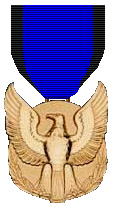| Four Chaplains' Medal | |
|---|---|
 | |
| Type | Military Medal |
| Awarded for | Extraordinary Heroism |
| Country | United States |
| Presented by | Secretary of the Army 86th United States Congress |
| Status | Inactive |
| Established | July 14, 1960 |
| First awarded | January 18, 1961 |
| Last awarded | January 18, 1961 |
| Awarded to | George L. Fox Alexander D. Goode Clark V. Poling John P. Washington |
| Total | 4 (posthumously) |
The Four Chaplains' Medal was a decoration approved by an Act of Congress on July 14, 1960 (P.L. 86-656, 74 Stat. 521).[1] The decoration recognizes the heroic actions of four Army Chaplains during World War II.
The statute awarding the medal is listed as follows:
Be it enacted by the Senate and House of Representatives of the United States of America in Congress assembled, That the President is authorized to award posthumously appropriate medals and certificates to Chaplain George L. Fox of Gilman, Vermont; Chaplain Alexander D. Goode of Washington, District of Columbia; Chaplain Clark V. Poling of Schenectady, New York; and Chaplain John P. Washington of Arlington, New Jersey, in recognition of the extraordinary heroism displayed by them when they sacrificed their lives in the sinking of the troop transport Dorchester in the North Atlantic in 1943 by giving up their life preservers to other men aboard such transport. The medals and certificates authorized by this Act shall be in such form and of such design as shall be prescribed by the President, and shall be awarded to such representatives of the aforementioned chaplains as the President may designate.[2]
Also known as the Chaplain's Medal of Honor and the Chaplain's Medal for Heroism, its design commemorates the actions of the Four Chaplains who gave their lives in the line of duty on February 3, 1943. The medal was designed by Thomas Hudson Jones (1892–1969) of the United States Army Institute of Heraldry. It was presented posthumously to their next of kin by Secretary of the Army Wilber M. Brucker at Fort Myer, Virginia, on January 18, 1961.[3]
- ^ "Army Chaplain Medal of Valor". United States Army Institute of Heraldry. March 23, 2015. Retrieved July 12, 2017.
- ^ "Public Law 86-656" (PDF). Office of the Law Revision Counsel. July 13, 1960.
- ^ "Federal Military Medals and Decorations". Foxfall Medals.